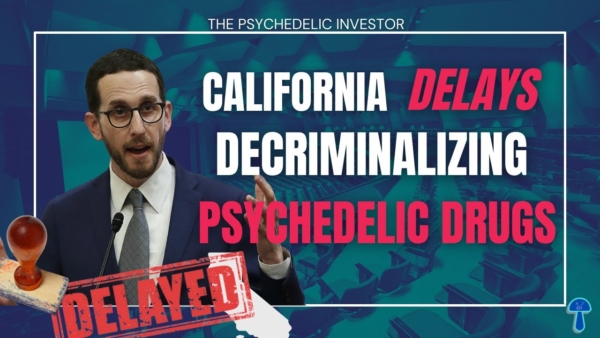
For Compass Pathways (Nasdaq: CMPS) the legal battles never seem to end. Mere weeks after the court saga determining whether their proprietary psilocybin, Comp 360, is indeed novel and deserving of a patent closed —in Compass’ favor— a new front has opened in the legal fight against the company.
This time, the question revolves around whether the psilocybin company stole trade secrets from psychedelic researcher Scott Thompson.
The story, originally broken by Psychedelic Alpha, involves a Compass patent that details combining psilocybin with a 5-HT2A antagonist to treat depression and other mental health issues. The company Terran Biosciences Inc. is suing Compass, claiming that the contents of the patent were stolen from Thompson. On Monday, August 8, District Judge Ellen Lipton Hollander was assigned the case.
To explain the embattled patent, essentially, Compass wants to explore whether combining psilocybin with a drug such as ketanserin, a 5-HT2A antagonist —which theoretically would abort a hallucination before it begins— would be equally effective in treating depression. In other words, psilocybin has been shown to be effective for some people in treating depression, but it’s an open question whether similar benefits could be achieved if the hallucination was edited out of the process. In essence, if combining psilocybin with a drug like ketanserin was equally effective as psilocybin alone, but without the hallucination, then the combination may be a safer and more effective medicine. This is what Compass had patented.
Interestingly, this is the same technology MindMed (Nasdaq: MNMD, NEO: MMED) once promoted as an LSD neutralizer.
In the lawsuit, Terran alleges that Scott Thompson had been conducting research on the “idea of co-administration of psilocybin with a 5-HT2A antagonist as a potential rapid, non-hallucinogenic antidepressant therapy” at the University of Maryland, Baltimore, since 2016. In 2019, he entered into a non-disclosure agreement (NDA) with Compass Pathways and began “numerous substantive discussions and negotiations” regarding a potential partnership.
After Compass —again according to Terran— repeatedly told Thompson that they were interested in a partnership, he disclosed his trade secrets in confidence, under the protection of an NDA. Then, Compass “abruptly ended negotiations” and “misappropriated the Psilocybin Trade Secrets for itself.”
By Terran’s telling of the story, it seems like a clear-cut case of Compass acting nefariously, and unethically seeking out Thompson’s trade secrets by dangling a partnership in front of him, then yanking it away once they had what they wanted. However, it must be stated that we have yet to hear Compass Pathways’ version of the story. As such, we can not make any definitive claims.
Hopefully, as this court case progresses, we will get more information.
That being said, this is not the first time that Compass has been accused by researchers of using their work unethically. According to Quartz, in 2015 Compass originally structured itself as a charity, and worked with an assortment of academics and researchers. Then, the charity transformed into a for-profit company, using the knowledge gained through their contracts and contacts they made as a charity. Quartz spoke with 9 such researchers who expressed “concerns about the company’s motives and aims” and “raised questions about Compass’s intentions and professionalism.”
Speaking with Quartz, all 9 charged that “Compass Pathways has relied on conventional pharmaceutical-industry tactics that could help them dominate the field, including blocking potential rivals’ ability to purchase drugs, filing an application for a manufacturing patent, and requiring contracts that give Compass power over academics’ research and are restrictive even by pharmaceutical-industry standards.”
In this case, Compass did refute any and all wrongdoing, saying at the time that “The allegations you have heard are simply false,” and that those making such claims were “malicious[ly] bias[ed].”
As the current lawsuit is a breaking story, it is too early to judge the veracity of the claims. Lawsuits and countersuits are common in the pharmaceutical industry. As Compass showed in the battle over the legitimacy of the Comp 360 patents, it is possible the courts will side in their favor. Hopefully, with time, the full details of the case will be revealed.
Full Disclosure: James Hallifax owns a small, sub $500 stake in Compass Pathways stock.





